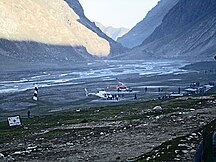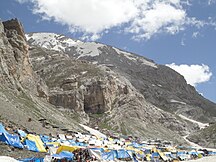Amarnath Temple: Difference between revisions
→Controversies: added environmental destruction section |
Shashankshr (talk | contribs) |
||
| Line 143: | Line 143: | ||
{{Commons category|Amarnath}} |
{{Commons category|Amarnath}} |
||
* [http://www.shriamarnathjishrine.com/amarnath-shrine-board.html Shri Amarnathji Shrine board: official site] |
* [http://www.shriamarnathjishrine.com/amarnath-shrine-board.html Shri Amarnathji Shrine board: official site] |
||
* [http://www.3marg.info/pilgrimages/shri_amarnath_yatra/shri_amarnath_yatra_2010.shtml Online Pictorial Tour] |
|||
{{Hindu Temples in Jammu and Kashmir}} |
{{Hindu Temples in Jammu and Kashmir}} |
||
{{Famous Shiva temples}} |
{{Famous Shiva temples}} |
||
Revision as of 14:16, 29 March 2012
| Amarnath Temple | |
|---|---|
 | |
| Religion | |
| Affiliation | Hinduism |
| Location | |
| Location | Amarnath |
| State | Jammu and Kashmir |
| Country | India |
| Architecture | |
| Creator | Natural formation |
| Website | |
| www.shriamarnathjishrine.com | |
Amarnath Temple Pilgrimage is an annual pilgrimage being made to the shrine Amarnath Temple by thousands of Hindu devotees on challenging mountainous terrain.
Located in the Indian state of Jammu and Kashmir and situated on Mount Amarnath, the Amarnath caves (Template:Lang-hi, Template:Lang-ur) are one of the most famous shrines in Hinduism. Dedicated to the god Shiva, the shrine is said to be over 5,000 years old. The shrine forms an important part of Hinduism.[1] The cave is surrounded by snowy mountains. The cave itself is covered with snow most time of the year except for a short period of time in summer when it is open for pilgrims.
Inside the 130 feet high, south facing Amarnath cave is the Shiva Linga, which waxes during May to August and gradually wanes thereafter.[2] This lingam is said to grow and shrink with the phases of the moon, reaching its height during the summer festival.[3]
According a Hindu legend, this is the cave where Shiva explained the secret of life and eternity to his divine consort Parvati.[4][5] Two other ice formations represent Parvati and Shiva's son, Ganesha.
The cave is situated at an altitude of 3,888 m (12,756 ft),[2] about 141 km (88 mi) from Srinagar, the capital of Jammu and Kashmir. The Central Reserve Police Force, Indian Army and Indian Paramilitary Forces maintain a strong presence in the region due to security concerns.[6]
The Lingam

The main purpose of this pilgrimage is the sight of Lingam representing the Lord Shiva himself. According to an unproven theory the formation is an ice stalagmite which resembles the Lingam, however this theory is challenged by the fact that the substance of the lingam is not the same as stalagmites found elsewhere. Additionally, the cave being existed for few thousand years, have not filled itself from the sedimentary material. The water thawing from the roof does not fall on the lingam itself which brings in doubt the stalagmite theory.[7].
Yatra

The temple is a popular yatra destination for Hindus. In 2011 it received about 634,000 people which was highest recorded number for the site[8]. Pilgrims visit the holy site during the 45-day season around the festival of Shravani Mela in July–August, coinciding with the Hindu holy month of Shraavana.
The beginning of the annual pilgrimage, called Amarnath Yatra,[9] to the Himalayan cave shrine is marked by 'pratham pujan' to invoke the blessings of Shri Amarnathji.[10]
Route

Devotees generally take the 42 km (26 mi) pilgrimage on foot from the town of Pahalgam, about 96 km (60 mi) from Srinagar, and cover the journey in four to five days. There are two alternate routes to the temple: the longer and more traditional path from Srinagar, and the shorter route from the town of Baltal. Some devotees, particularly the elderly, also ride on horse-back to make the journey.
The State Road Transport Corporation and Private Transport Operators provide the regular services from Jammu to Pahalgam and Baltal. Also privately hired taxis are available from Jammu.
From Pahalgam
Pahalgam, Chandanwari, Pissu top, Zoji Bal, Naga Koti, Shesh Nag, Warbal, Mahaganstop, Pabibal, Panchtarni, Sangam, Amarnath Cave. Approximately 42 km (26 mi)
From Baltal
Baltal, Domail, Barari, Amarnath Cave. Approximately 14 km (8.7 mi). This route although being shorter, it is a more challenging route.
Facilities
Pandals En Route To Shrine
En route to the holy cave, various non profit organizations set up food supply and resting tents called as pandals which are available for free to the pilgrims.
Tents For Hire
Near the shrine, hundreds of tents which are erected by locals can be hired for a night's stay.
Helicopter Services
Helicopter services from base camp to Panjtarni (6km from the cave) are also available from various private operators.[11]
Security
Every year, thousands of central reserved police force and state police are deployed to provide security to pilgrims from potential terror threats
The forces position at various halts and also in the perimeter of the shrine. [12]
Organizers
Officially, the Yatra is organised by the State Government in collaboration with the Shree Amarnath Yatra trust. The Government agencies provide necessary facilities all along the route during the Yatra period, which includes provision of ponies, supply of power, telecommunication facilities, firewood and setting up of fair price shops.[13]
Terrorist Attacks
1990s Problems
The pilgrimage was banned from 1991 to 1995 due to threats from militants. In 1996 the militants had assured that they would not interfere allowing a resumed yatra with far greater numbers than in previous years. However, unseasonal blizzards in late August of that year caught up to a lakh pilgrims by surprise in a tragedy that claimed the lives of 242 yatris, killed by exhaustion and exposure.[14][15]
2000 Massacre
Four years later, the pilgrimage suffered another setback with the massacre in Pahalgam of 30 people by Kashmiri separatist militants.[16] Most were yatris on their way to Amarnath[17] or porters and horsemen who would have ferried the pilgrims to the site.[18] Then Indian Prime Minister Atal Bihari Vajpayee blamed Lashkar-e-Taiba for the killings.[19]
Controversies
2006 Artificial Shiva Linga controversy
In the year 2006, a controversy broke up about an artificial Shiva Lingam in Amarnath. In 2006, the natural Shiva Lingam was very small at the onset of the Yatra. Hence to keep the Yatra going Shri Amarnath Shrine Board, under the guise of keeping the cave cool dumped loads of dry ice right over the original shiva linga. This was a huge controversy, but did not impact the Yatra. There are two water channels which flow above and below the ice lingam. The water from these channels leads to the formation of the shiva lingam. During the earthquake of 2005, it is believed that these channels were disturbed which led to the poor formation of the ice lingam. The subsequent years the ice shiv lingam was well formed so the channels must have reformed.
2008 Land transfer controversy
On 26 May 2008, the Government of India and the state government of Jammu and Kashmir reached an agreement to transfer 100 acres (0.40 km2) of forest land to the Shri Amarnathji Shrine Board (SASB)[20] to set up temporary shelters and facilities for Hindu pilgrims. Kashmiri separatists opposed the move citing reasons that it will jeopardize the article 370 that gives separate identity to the people of Jammu and Kashmir and prevents any Indian citizen to settle in Kashmir. People in Kashmir staged widespread protests against this decision by government of India.[21] Due to the protests, the J&K State government relented and reversed the decision to transfer land. As a result, Hindus in the Jammu region launched counter-agitations against this roll back.[22]
Environmental Destruction
Environmentalists have expressed concern that the number of people participating in the Amarnath Yatra is having a negative impact on the area's ecology and some have expressed support for government regulated limits on the number of pilgrims permitted to make the trek.[23]
Popular Culture
Famous Santoor artist Rahul Sharma named a track after Amarnath temple as "Shiva Linga: The Amarnath Cave"[24]
See also
- List_of_caves#India
- List of rock cut temples in India
- Amarnath land transfer controversy
- 1996 Amarnath Yatra tragedy
- 2000 Amarnath pilgrimage massacre
Gallery
-
Pilgrims riding ponies on the way to Amarnath Cave
-
Breathtaking scenery on way to Amarnath Cave
-
Pandals in service to the pilgrims
-
Helicopter service up to panjtarni on route to Amarnath Cave
-
Tents are available to hire for a small fee near base of imposing Amarnath Cave as visible in background
References
- ^ "New shrine on Amarnath route". The Hindu. 30 May 2005.
- ^ a b "Amarnathji Yatra - a journey into faith". Official Web Site of Jammu and Kashmir Tourism.
- ^ Ortner, Jon. On the road again. PDN Gallery.
- ^ Page 84, The Holy Himalayas By Shantha N. Nair
- ^ "Amarnath Cave - The legend". Bhole Bhandari Charitable Trust.
- ^ "The pilgrimage to Amarnath". BBC News. 6 August 2002. Retrieved 23 April 2010.
- ^ Chapter 11, Amarnath, The Celebrated Cave, Page 127, 128 from book Kashmir Shaivism: under siege By M. G. Chitkara
- ^ http://zeenews.india.com/news/nation/amarnath-yatra-record-6-34-lakh-visit-shrine_725854.html
- ^ Amarnath yatra likely to start from June 29, June 19, 2011 13:33 IST, rediff.com
- ^ Amarnath yatra's pratham pujan held near Pahalgam, June 15, 2011 23:04 IST, rediff.com
- ^ How to Reach Amarnath Road Routes to Amarnath from Popular Holiday places
- ^ http://ibnlive.in.com/news/high-security-on-amarnath-yatra-routes/163441-3.html
- ^ http://nvonews.com/2011/06/07/amarnath-yatra-2011-the-countdown-begins/
- ^ Rediff On The NeT: Harkatul Mujaheedin 'bans' Amarnath Yatra
- ^ http://rajyasabha.gov.in/journals/178/26081996.htm
- ^ Amarnath pilgrimage resumes, BBC, 2000-08-04
- ^ Night of massacres leaves 105 dead in valley, The Tribune, 2000-08-03
- ^ Muslim militants kill 21 Hindu pilgrims in Kashmir, The Independent, 2000-08-02
- ^ Prime Minister Vajpayee's statement in Parliament regarding the recent massacre in Jammu & Kashmir
- ^ Amarnath land row: SASB CEO removed
- ^ Jammu is not for burning – 2008 Rediff.com India
- ^ Economic blockade affects life in Kashmir
- ^ [1]
- ^ http://www.amazon.co.uk/Shiva-Linga-The-Amarnath-Cave/dp/B001OB2PX4
External links





